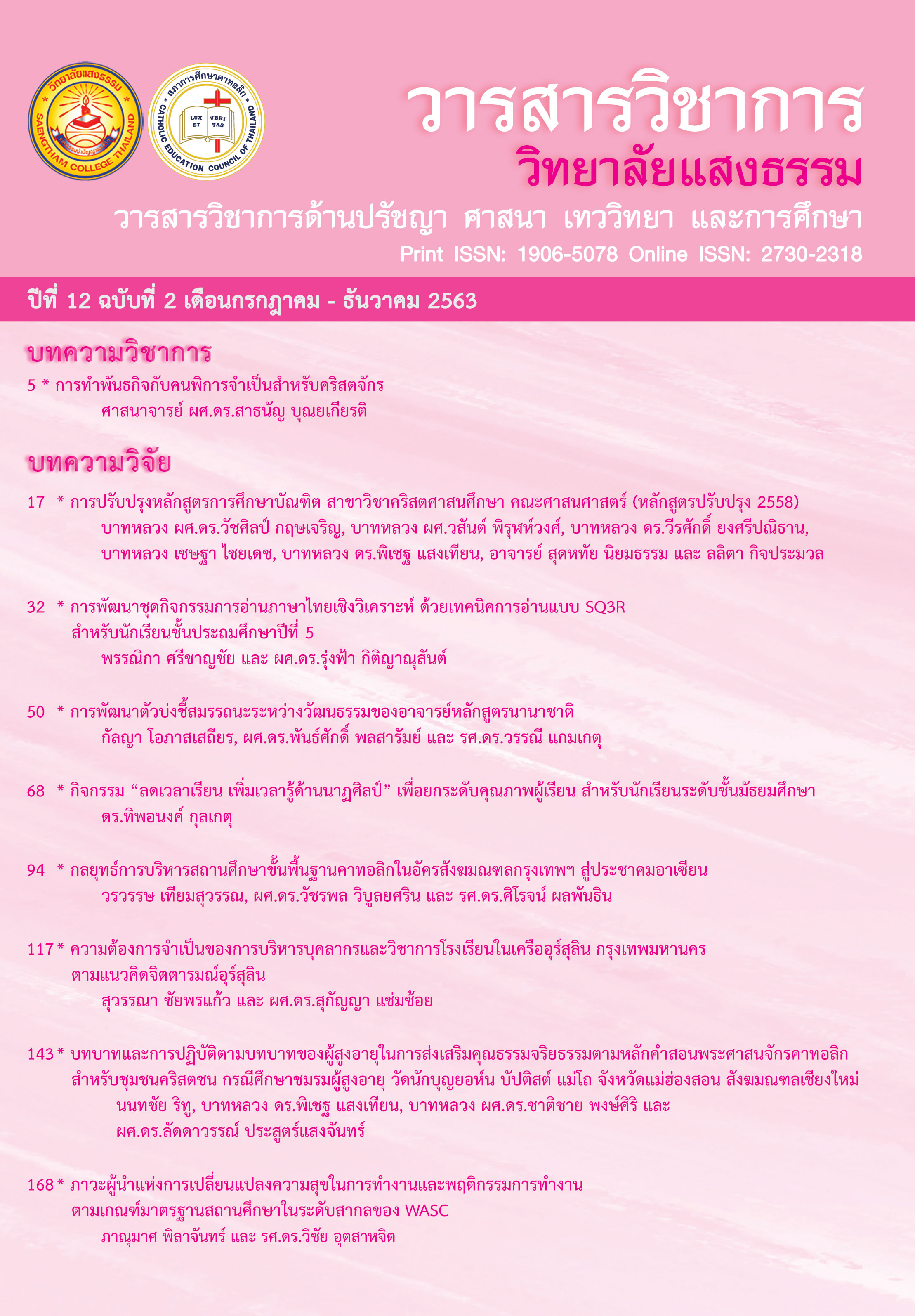Development of Intercultural Competency Indicators of Faculty in International Program.
Main Article Content
Abstract
The objectives were 1) to develop intercultural competency indicators of faculty in international program under Governmental Thai Higher Education and scale 2) to confirmatory intercultural competency indicators of faculty in international program model with empirical data. The sample used was 300 international faculties under Governmental Thai Higher Education by Multi-stage random sampling. The instruments used were a specialist interview form and an intercultural competency of faculty in international program scale. Data analysis with Content Analysis, Descriptive Statistics and Confirmatory Factor Analysis (CFA) were conducted by using the statistical software. The result found: 1) Intercultural competency of international faculties consisted of 3 dimensions with 7 indicators: (1) communication and multicultural knowledge were measured by using two indicators: intercultural communication knowledge, multicultural student knowledge (2) attitude of multicultural were measured by using 3 indicators: awareness in multicultural of student, open-mind to multicultural of student, curiousness in multicultural of student (3) participation and teaching with multicultural student were measured by using 2 indicators: participation with multicultural student, multicultural student teaching. An intercultural competency of faculty in international program scale were concluded three dimensions seven indicators, five levels. The indicators were of good quality with Cronbach's coefficient alpha .947 2) Intercultural competency of international faculties model developed were found to be consistent with the empirical data that considered from indices used for checking validity of the model χ2=5.55,df=8, P-value=0.698, χ2/df =0.694, CFI=1.00, GFI=0.99, AGFI=0.98, SRMR=0.014, RMSEA= 0.000 and CN=1076.10.
Article Details
- The academic and research articles, as well as the content and opinions expressed therein, published in Saengtham College Journal are solely the responsibility of the respective author(s).
- Articles published in Saengtham College Journal are the property of Saengtham College. Reproduction, modification, or dissemination of all or part of the content in any form without written permission from Saengtham College is prohibited.
- Articles published in Saengtham College Journal are protected under the Copyright Act.
References
จรัญญา เทพพรบัญชากิจ. (2556).“ประสิทธิภาพของรูปแบบการบริหารจัดการที่มีการเรียนการสอนหลักสูตรนานาชาติของมหาวิทยาลัยเอกชนไทย.” (ปริญญาดุษฎีนิพนธ์). สาขาวิชาการวิจัยและพัฒนาการศึกษา, คณะศึกษาศาสตร์ มหาวิทยาลัยเชียงใหม่.
ชุตินันท์ จันทรเสนานนท์. (2553). การพัฒนาแบบวัดสมรรถนะเชิงวัฒนธรรมสำหรับนักเรียนมัธยมศึกษา. (วิทยานิพนธ์ปริญญาครุศาสตรดุษฎีบัณฑิต). สาขาวิชาวิทยาการวิจัยการศึกษา บัณฑิตวิทยาลัย, จุฬาลงกรณ์มหาวิทยาลัย.
ณิชาภา จันทร์เพ็ญ. (2555). การพัฒนาตัวบ่งชี้และแบบวัดสมรรถนะข้ามวัฒนธรรมของครู: การทดสอบความไม่แปรเปลี่ยนของการวัดตามภูมิหลังของครู. (วิทยานิพนธ์ปริญญาครุศาสตรมหาบัณฑิต). สาขาวิชาวิธีวิทยาการวิจัยการศึกษา บัณฑิตวิทยาลัย, จุฬาลงกรณ์มหาวิทยาลัย.
นงลักษณ์ วิรัชชัย. (2542). โมเดลลิสเรล (LISREL): สถิติวิเคราะห์สำหรับการวิจัย. กรุงเทพฯ: จุฬาลงกรณ์มหาวิทยาลัย.
ศิริชัย กาญจนวาสี. (2555). สถิติประยุกต์สาหรับการวิจัย. กรุงเทพมหานคร: โรงพิมพ์แห่งจุฬาลงกรณ์มหาวิทยาลัย.
Anita Gopal. (2011). “Internationalization of Higher Education: Preparing Faculty to Teach Cross- culturally”. International Journal of Teaching and Learning in Higher Education : Vl.13Queens University.
Alvino Fantini, Aqeel Tirmizi. (2006). Exploring and Assessing Intercultural Competence. SIT Graduate Institute/SIT Study Abroad Digital Collections@SIT.
Chonh Pui Yee. (2013). Internationalization of Higher Education: A Literature Review On competency approach. College of Foundation & General Studies, Universiti Tenaga Nasional, Jalan IKRAM-UNITEN, Kajang, Malaysia.
Deardorff, Darla K. (2006). “The Identification and Assessment of Intercultural Competence as a Student Outcome of Internationalization at Institutions of Higher Education in the United States”. Journal of Studies in International Education. Fall 2006, p.241-266 and The SAGE Handbook o Intercultural Competence.


